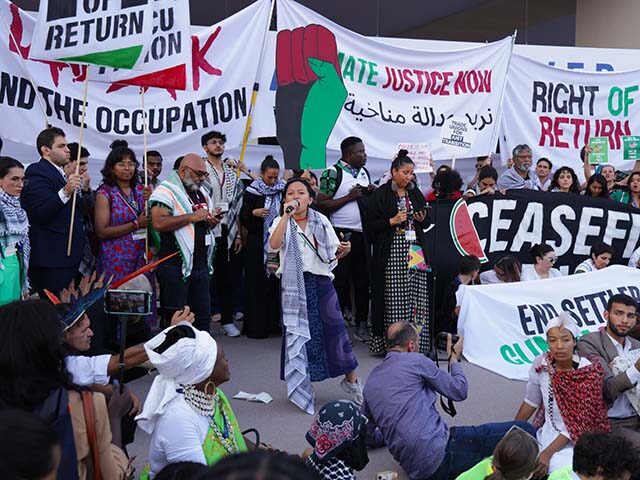The Associated Press (AP) on Sunday denounced the “shocking level of censorship” imposed by the United Arab Emirates (UAE) on the COP28 climate change conference in Dubai. The AP was mortified by “sharp restrictions on what demonstrators could say, where they could walk and what their signs could portray.”
“At times, the controls bordered on the absurd,” the AP said, pointing to a rule that prevented demonstrators from waving signs with the names of detained activists, a 500-strong pro-Palestinian protest group that was prevented from leaving the U.N.’s “Blue Zone” in Dubai, and a ban on the genocidal Palestinian slogan “from the river to the sea.”
“It is a shocking level of censorship in a space that had been guaranteed to have basic freedoms protected like freedom of expression, assembly and association,” said appalled Human Rights Watch (HRW) researcher Joey Shea.
Scottish professor Dylan Hamilton urged demonstrators to persevere despite the UAE’s restrictions.
“It’s essential to remind negotiators what they are negotiating about. It’s trying to remind people to care about people you’ll never meet,” Hamilton said.
The AP described the frustrated activists as “pro-Palestinian protesters who were calling for a ceasefire and climate justice.” When they were told they could not chant “from the river to the sea,” they donned Palestinian scarves and waved pictures of watermelons, which have become “symbols of Palestinian resistance” (watermelons are grown by many Palestinian farmers and they mimic the colors of the Palestinian flag).
It was not clear why activists demanding a ceasefire to protect a terrorist organization should be an “essential” component of a climate change conference. If anything, climate crusaders should be furious at Hamas for constantly launching swarms of poorly aimed rockets, whose carbon-spewing engines Hamas powers by siphoning vast amounts of fossil fuel from the Gaza infrastructures. Those paragliders the terrorists used to launch their rape, murder, and kidnapping spree on October 7 were not running on solar panels, either.
Hamas’s theft of money and materials meant to develop civilian infrastructure in Gaza has led to endless terrorist attacks and ruinous wars, as well as putting Gaza far behind the curve in developing clean energy technologies and other environmental improvements. The climate movement demands trillions of dollars in sacrifices from the civilized world, but cannot muster any criticism of Hamas for spending lavish sums on terror tunnels and hidden fuel depots.
Most of the censorship denounced by the AP and its correspondents should not have come as a surprise. As the article itself conceded, the rules governing the “Blue Zone” in Dubai have been on the books for years. The United Nations itself prohibited the genocidal “from the river to the sea” chant, not the UAE government.
The most significant restriction imposed at the last minute appears to be the ban on waving signs with the names of imprisoned activists, particularly Ahmed Mansoor of the UAE and Alaa Abdel-Fattah of Egypt, whose cases were summarized by the AP:
Mansoor, the recipient of the prestigious Martin Ennals Award for Human Rights Defenders in 2015, repeatedly drew the ire of authorities in the United Arab Emirates, calling for a free press and democratic freedoms in this autocratic federation of seven sheikhdoms. He had been targeted with Israeli spyware on his iPhone in 2016 likely deployed by the Emirati government ahead of his 2017 arrest and sentencing to 10 years in prison over his activism.
Abdel-Fattah, who rose to prominence during the 2011 pro-democracy Arab Spring uprisings, became a central focus of demonstrators during last year’s COP27 in Sharm el-Sheikh, Egypt, as he had stopped eating and drinking water to protest his detention. He has spent most of the past decade in prison because of his criticism of Egypt’s rulers.
Amnesty International (AI) Secretary-General Agnes Callamard told Agence France-Presse (AFP) that the obstacles to activism at COP28 are “slightly larger than previous years despite no changes to the guidelines.”
“The number of negotiations and hurdles to me indicate that the interpretation of the (UN) rules are largely driven by the (UAE) environment in which we operate,” she told AFP, offering a more modest critique than the alarms raised by the AP.
Callamard pointed out that AI’s planned demonstration on behalf of Ahmed Mansoor, the detained Emirati activist, has been “twice delayed pending approval by the U.N. body managing the climate talks,” and the U.N. is demanding “certain changes” before granting that approval.
AFP pointed out that the U.N. has “restrictions which ban the naming of states, leaders or companies as well as the raising of country flags,” so those impositions upon activists are not purely the work of the UAE government.
“There are many steps which have very little to do with U.N. regulations because we follow them to the word and have a lot to do with how the rules are interpreted in a country such as the UAE,” she added, working in a dig at the “repressive environment” of the Emirates.
“What we can not accept is for the political restrictions and the civic restrictions of the UAE to be normalized in the context of a U.N. meeting on climate justice,” she said, declaring that AI would comply with restrictions imposed by the U.N., but not those from the Emirati government.
Although it seems some of the censorship vexing activists in Dubai is coming from the U.N. and climate conference organizers, there is no question the UAE is a repressive government. Freedom House gave the UAE its usual dismal rankings on free speech and Internet freedom in 2023.
The UAE is “one of the world’s most connected countries,” as Freedom House noted, with 99% Internet penetration of households and some of the world’s highest per-capita metrics for broadband and wifi usage. However, the UAE government maintains heavy surveillance on dissident Internet users and frequently punishes people for writing social media posts critical of the state. Civil and personal liberties are sharply restricted outside the Internet as well.

COMMENTS
Please let us know if you're having issues with commenting.